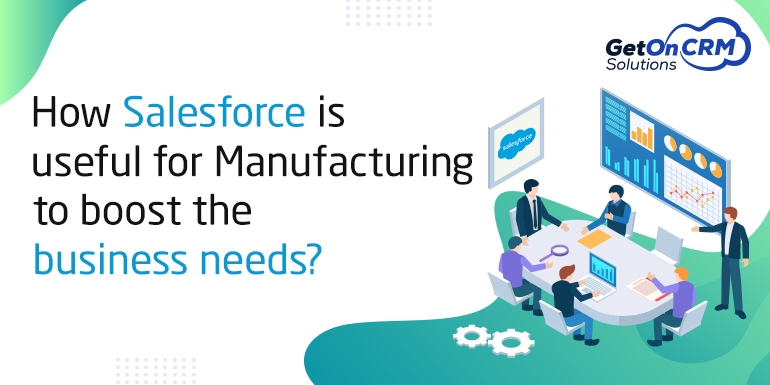
How Salesforce is useful for Manufacturing to boost the business needs?
- December 25, 2019
- 7 minutes
- 1999
While the traditional business process seems to lose its relevancy in the fast-paced and rapidly evolving technological era, manufacturers look for new ways to do business. In order to keep up with the latest technologies, organizations are undergoing digital transformations to stay ahead in the competitive race.
Companies are undergoing digital transformations to change their existing business models to keep up with technology and stay in the race.
Competing in today’s competitive environment with outdated technologies is a challenging task. To overcome these challenges, the business will require adopting modern technologies.
Without proper simplification and optimization, business operations are likely to become more complex. Further, the use of costly product management software may prove to have an adverse effect on the ROI of the organization.
Deploying CRM is one of the reliable options for manufacturing companies. With detailed insights about inventory management, warehousing, order processing, distribution chains, and operations, a business can avail of better outcomes.
Empowering the organizations with the production schedule management ability, and intelligent supply chain offers optimum results. It also enables effective maintenance of material supply and quick movement of products from the production site to the market.
The inability to manage order and forecast demand is one of the major problems faced by most manufacturers. It leads to difficulty in understanding the needs of the customers.
Leveraging CRM platforms like Salesforce helps businesses in overcoming such challenges successfully.
Over the past few years, Salesforce has emerged as one of the most widely recognized and talked about customer relationship management (CRM) cloud software systems. For those of you still stuck using spreadsheets and other ad hoc systems to manage sales, however, the idea of a cloud CRM like Salesforce may be a new concept.
Salesforce.com offers several key products – ExactTarget Marketing Cloud, Service Cloud, Chatter, Salesforce1 Platform, Salesforce Communities, Work.com, Pardot, and the most popular of all, Sales Cloud.
While operation and production management becomes imperative for the manufacturing industry, enhancing sales as well as marketing is often postponed. To help businesses manage their services and customer requests, the CRM platform evolves as an optimum solution.
But when it comes to choosing the right customer relationship management platform, it becomes a challenging task owing to the availability of a wide range of options. But among all the CRM platforms, Salesforce with all the essential features is a popular choice for businesses. It helps in overcoming the challenges that the Enterprise Resource Planning (ERP) platforms fail to manage. By simplifying the business processes, Salesforce has benefited the manufacturing industry in a number of ways.
Increased Sales Performance
The Salesforce platform offers detailed insights into the sales activities as well as customer history of a business. With efficient tracking of the important sales data, Salesforce helps in improving the accessibility and transparency across different departments of an organization.
Moreover, the accurate predictions made by Salesforce offers the sales team a better view of their targets. It also businesses in saving more time by eliminating the need for the tabulation of the important sales data. By providing a clearer picture of the goals and simplifying the processes, Salesforce ensures better delivery of after-sale service and enhances user engagement. Overall, Salesforce help in building and sustaining a firm customer relation.
Increased Customer Satisfaction
While customers are the core of every business, they strive to deliver customer-centric services for better customer retention. With ideal customer services, building a strong customer relationship, and creating a positive impression becomes easy.
In order to remain profitable in the long run, most businesses offer efficient customer services. But with the growing demand for Salesforce, businesses are now realizing the importance of the platform in marketing and selling their products to potential customers.
Through cloud support, resolving customer grievances also becomes easy for businesses. Salesforce can even be used for the tabulation of essential customer data, including purchased models, warranties, and past dealings with the organization. It ensures all the required customer data can be easily accessed whenever required.
Wider Market Coverage
While retaining existing customers is important, relying only on such customers cannot help in growing a business. Instead, expanding the business to new market regions helps in reaching more customers and maximizing business profits.
But business expansion is not an easy task. It requires a lot of meticulous planning and proper execution. In such a situation, Salesforce comes to help. With appropriate data about the leads, Salesforce makes it easier for the sales team to target the right customers and ensure successful conversions.
Salesforce offers opportunities for cross-selling and allows accessibility from anywhere., thereby enabling wider market coverage and profit maximization.
CRM-ERP Integration
When it comes to managing the stock or inventory-related data, Enterprise Resource Planning (ERP) is the widely used platform. But with the integration of the databases of CRM and ERP, businesses can avail a 360-degree view of their customers.
Important information like buying behavior of customers, their order history, and more can help a business in building long-lasting relations and ensuring future growth. When Salesforce is merged with ERP platforms, the integrated database forms a good source for making business sales predictions.
The interface enables easy access as well as management of data and keeps a record of every progress that the business makes.
The valuable customer insights offered by Salesforce helps in providing your business with a competitive edge over others.
“Who is the customer?”
Not only the companies whom you sell but also who in the company is actually responsible for the purchase decision?
“What do they buy?”
Apart from the specifications, what is the motivation factor that compels them to make the purchase? What is the reason behind choosing a particular product over others?
“How do they buy?”
What are the procurement processes? Can you help them with their procurement?
“How do they find out about new products?”
How do they go from Never a Customer to Always a Customer?”
Understanding these core questions, along with other important questions, can help you identify your target customers and determine the relationship they want to establish with their suppliers. CRM Software makes it easier to manage customer relations.
Some of the important features of Salesforce are:
- Lead Management
- Forecasting of Sales
- Account and Contact Management
- Duplicate Blocking
- Salesforce Mobile App
- Opportunity Management and Score
- Dashboards
- Mass Email
- Campaign Management
- Drag and drop interface
- Web-to-Lead capture
- Case Management
- Quotes, Orders, Price Books, Products, and Contract
- Partner Communities
- Files, Chatter, Recommendations, and Topics



